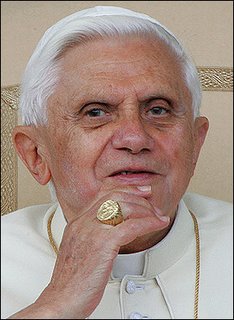
With B16 following so closely (slavishly, I might add) in JP2's footsteps, one might not have expected to see much change in the way things are done in the RC kingdom. But perhaps former Cardinal Ratzinger has a heart after all. I quote an article from American Chronicle, to let you make up your own mind.
Is B16 contemplating big changes? Or is just going to nibble around the edges of a scandalous separation of Catholics from the Eucharist that was instituted to sustain them, espcially in the wake of a failed marriage?
Pope Benedict's approach to divorce
Roland Flamini
August 16, 2005
Can things be looking up for divorced Catholics who re-marry? The late Pope John Paul II's approach to the problem was tough and uncompromising. Catholics who entered into a civil marriage following a divorce were in a state of "moral disorder, opposed to the precise requirements deriving from the faith," the pope declared in 1997. As such they were barred from taking Holy Communion.
But recent remarks on the issue by Pope Benedict XVI seemed like a small, flickering candle of hope that the old hard line on this problem was softening.
...In Italy's Aosta Valley, where he was vacationing last month, the pope discussed divorce at a closed-doors meeting with 140 local priests. Asked about administering to divorced Catholics who had re-married, the pope delivered one of those complex replies that have become familiar. Where Pope John Paul seemed to regard their situation with severity, Benedict XVI's response reflected compassion.
"I would say," -- he began, citing a specific situation -- "that a particularly painful situation is that of those who were married in the church, but were not really believers and did so just for tradition, and then finding themselves in a new, non-valid marriage, convert and find the faith only to feel excluded from the sacrament." He said he had thought, based on discussions in the past with several bishops, that the original church marriage could be considered invalid because the couple marrying had not believed it in the sacrament in the first place. But he added, "From the discussions we had I understood that the problem was very difficult, but given the suffering of these individuals, it needs to be studied further."
He said divorced Catholics who had re-married should go to Mass (something not explicitly mentioned by his predecessor) even if they could not receive communion. The Eucharist (Mass) without receiving communion is incomplete, "an essential element is missing," the pope said, "but it is not nothing."
He said the situation in the Orthodox Church was sometimes mentioned as a model because divorced members of the Orthodox Christian denomination were allowed to re-marry and to receive communion. "But only the first marriage was sacramental," he told the gathering. "Even (the Orthodox Church) acknowledges that subsequent marriages are not Sacraments, but marriages of a lesser kind." Such marriages were allowed at the discretion of the clergy to prevent a couple from continuing to live outside wedlock.
What gives his remarks extra significance is the fact that improving relations with the Orthodox Church is one issue where Pope Benedict XVI has picked up where his predecessor left off. The conversation with the clergy was also typical of his emerging personal style -- learned, complex, and at the same time forthright.

No comments:
Post a Comment